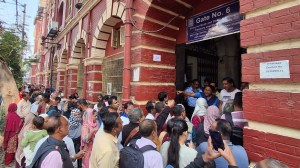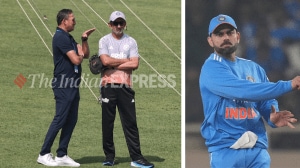Universal health cover: NAC set to submit suggestions
The National Advisory Council (NAC) is set to submit its recommendations
The National Advisory Council (NAC) is set to submit its recommendations to the Centre on the Universal Health Coverage,or publicly funded healthcare to all Indians,on Friday.
A committee set up by the Sonia Gandhi-led panel,headed by members Mirai Chatterjee and Prof A K Shivakumar,has been working on the proposed legislation,which along with the food security Bill is slated to be the UPAs showpiece achievements ahead of the Lok Sabha polls.
The committees recommendations state that it draws from commitments made already to universal healthcare,as early as by the Bhore Committee Report in 1946 and most recently by the Planning Commission-appointed expert group on Universal Health Coverage headed by Dr Srinath Reddy,which submitted its report in 2011.
Universal Health Coverage would mean entitling every citizen to a guaranteed national health package (covering both in-patient and out-patient care) that is provided cashless at the point of delivery either by government,and where there are critical gaps,by contracted-in private providers.
Shivakumar told The Indian Express that the public provision of healthcare is not something the state can evade anymore. The financial neglect of public healthcare definitely needs to be reversed. Private healthcare,even if subsidised,or private health insurance,subsidised by the State,cant meet the challenge, he said. This has never happened anywhere in the world given the informational asymmetry (the patient can be easily conned by profit-seeking providers) and because of the public goods character of healthcare thanks to the interdependences involved.
Nearly every country in the world,which has achieved anything like universal health coverage,has done it through the public assurance of primary healthcare,whether in Europe,Canada,or much of East Asia, Shivakumar said.
The system proposed is along the lines either already in place or being set up by at least 70 developing countries,including Mexico,Brazil,China,Sri Lanka and Thailand.
The NAC working group is said to have zeroed in on the deficiencies in Indian healthcare and has identified out of pocket expenses or the money spent on healthcare by the people as a major reason for impoverishment for a sizeable section of Indians. This along with low levels of government expenditure on accessible and quality heath has resulted in health inequity,inadequate availability and reach,unequal access,poor-quality and costly healthcare services,the NAC says. The per capita public spending on health is grossly insufficient.
With the proportion of out-of-pocket expenses in India (69 per cent) being among the highest in the world,higher than even Sri Lanka and Bangladesh in the region,the pitch is being made for government to invest much more above the 1.87 per cent currently allocated to healthcare in government budgets.
The Common Minimum Programme drafted 10 years ago made the commitment of 2.5-3 per cent of GDP to be set aside for health over five years.
The model to finance universal healthcare being recommended by the NAC is sought to be one where tax revenues totally fund at least primary and secondary healthcare in the country. The NAC is against insurance-based model as interests of the patients,providers and insurance companies are not always aligned.
Another complication being tackled by the NAC is of state governments being major players in the health story and of coordination between the states and the Centre required to effectively tackle health issues. The NAC committee has thought of an elaborate framework to incentivise health spends by state governments as well as make states accountable for not spending adequately on health from the Centres provisions.
The recommendations will make also detailed proposals to address the problems of urban healthcare,an area largely ignored by schemes so far.
- 01
- 02
- 03
- 04
- 05































